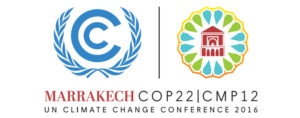To keep the momentum of the World Energy Congress and the Council’s thought leadership on embracing the new energy frontiers, the World Energy Council brought their 7 new realities messages launched during its World Energy Congress to the 22nd Conference of the Parties (COP22) negotiations in Marrakech.
The World Energy Council focused the discussions on the Grand Energy Transition and what these new realities mean in a post COP21 world. How can the energy sector contribute to the activation of innovative policies, technologies and business models that will secure a sustainable energy future?
The conclusions from our World Energy Scenarios to 2060 shows that we haven’t done enough to decarbonise our economies: the world will have to accelerate the decarbonisation of the global GDP to a rate of 6%/yr in order to remain within the carbon budget associated with 2oC global warming. This will take considerable effort since with current trends we could reach and surpass the carbon budget between 2045 and 2055, even with optimistic assumptions on energy intensity reductions.
The Nationally Determined Contributions (NDCs) agreed at COP21 provide about 1/3rd of the required ambition level. Rapid and successful transitioning of global transport to low carbon solutions presents the biggest obstacle or opportunity in achieving climate goals.
Current market signals alone are not enough to improve critical areas such as energy efficiency, improved electrical storage, penetration of clean transport and much needed adoption of Carbon Capture, Utilisation and Storage (CCUS). Clear, focused and unambiguous policies and institutional frameworks are required to reinforce a wider deployment of solutions that accelerate the transition and drive consumer choice towards the most carbon and cost effective solutions.
These messages were brought by a delegation of the Council that took part into several official UN and other side events across the 2 weeks.
Engagement started on the 11th of November, the UN official “Energy” and “Business” day, where Stuart Neil, Senior Director World Energy Council led a panel discussion about “New energy realities: Building a resilient and low-carbon future.” Co-organised with the International Chamber of Commerce, the session set the context of the new energy realities in a post-COP21 world and explored what it takes for companies, investors and governments to innovate and build tomorrow’s sustainable energy future.
Key contributions were made by energy companies such as Marcus Thill, President of Bosch Africa, Tanya Morrison from Shell and Gilbert Vermot Desroches from Schneider Electric whom explained that solutions to secure sustainable energy compared to “blueberries” - small, agile, efficient, delocalised - business model solutions against the current “watermelon” on the grid systems we currently rely heavily upon.
Abyd Karmali, Managing Director, Climate Finance from Bank of America Merrill Lynch and Michael Wilkins, Managing Director, Infrastructure Finance Ratings at S&P Global Ratings, brought the finance perspective with Mr Karmaly explaining how “Green bonds are helping to accelerate decarbonisation of the power sector and electrification of road transport as well as improvements in energy productivity”. Luis Miguel Galindo from ECLAC highlighted the policymaker point of view with concrete examples from Latin America.
This discussion was continued and focused on resilience in a more private setting, during a breakfast briefing co-organised by World Energy Council, BDI (Germany) and the ICC on Tuesday the 15th November where Didier Sire, Senior Director, World Energy Council, looked at what Modern Jazz, Unfinished Symphony and Hard Rock energy scenarios meant for the Climate agreement.
The Council also led the discussions at both the World Climate Summit 2016 on the 13th of November with a session on how Low Carbon Solutions can be Growth Catalysts for the 21st Century with specific examples being brought by key actors from Burkina Faso, Uganda as well as UNEP and Bertrand Piccard from Solar Impulse and at the Sustainable Innovation Forum 2016. Organised by UNEP and Climate Action on the 15th and 16th of November, the event welcomed over 800 high level delegates at the largest business focused side event taking place at COP22, where our new Vice Chair for Africa, Commissioner Ibrahim, explained the value of the Energy Trilemma to catalyse policy, innovation and projects.
On the 17th of November, the World Energy Council, together with project partner ADEME, launched the latest Energy Efficiency Policies report at an official UN side event in the Francophonie pavilion. Francois Moisan, Executive Chair of the report and Didier Sire, World Energy Council’s Senior Director, as well as top level speakers from ADEME, ENERDATA, Lebanon, Senegal and Tunisia united in an expert conversation about how energy efficiency provides a straight path towards energy sustainability.
Key Findings of the report where highlighted including the fact that over the last 15 years’ energy efficiency improvements have saved the world 3.1 gigatonnes (Gtoe) of primary energy consumption and 7Gt of Co2, in 2014 equating to 23% of global energy consumption and 21% of global Co2 emissions in 2014. It was also discussed that industrial electric motors and electric motor driven systems consume almost half the world’s total electricity, and account for 70% of total electricity consumption within industry world-wide. The cost-effective potential to improve the energy efficiency of motor systems representing roughly 20%-30%.
More information on what was called “a reference” report when it comes to energy efficiency by Nejib Osam from the National Energy for Energy Conservation of Tunisia is available here: http://www.worldenergy.org/publications/2016/energy-efficiency-a-straight-path-towards-energy-sustainability






